discomfort support
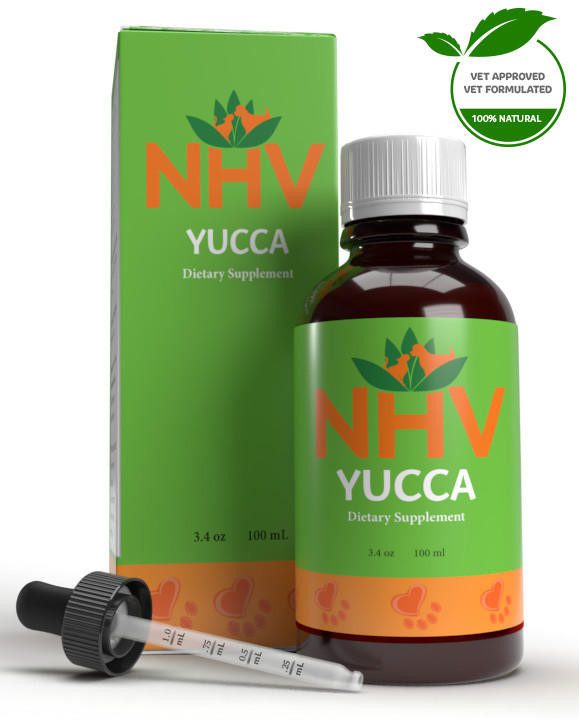
free shipping over $100 (USA & Canada)
1-877-937-4372 the pet expert hotline
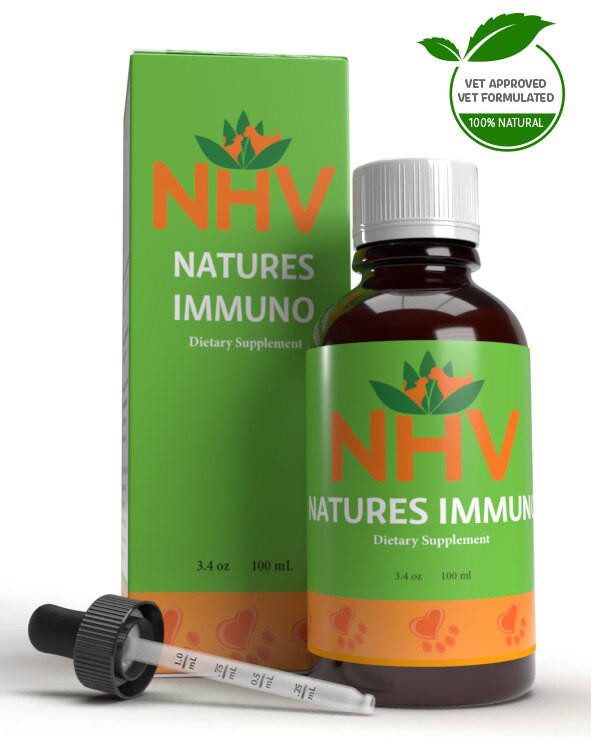
Vet-Formulated Supplement of Medicinal Mushrooms for Dogs

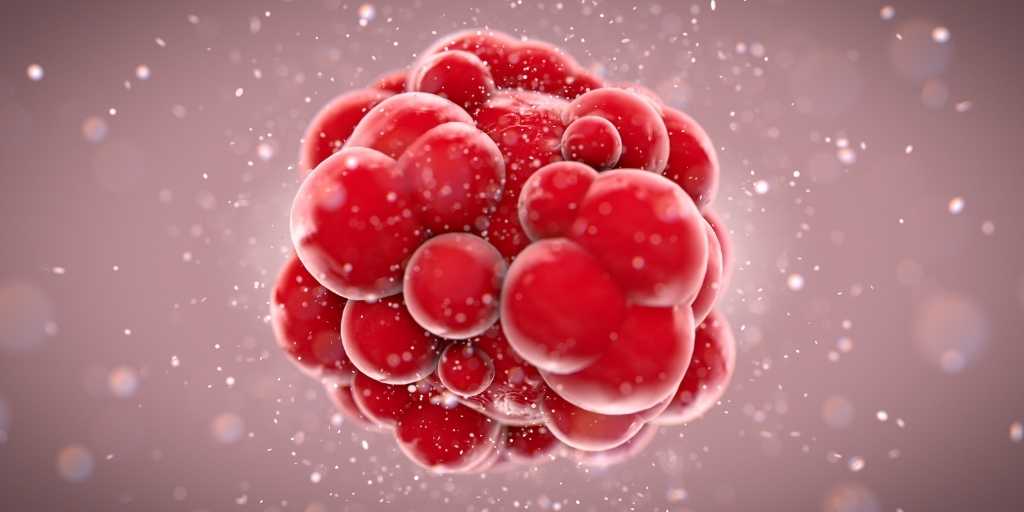
Mast cell tumors in dogs are unfortunately a common condition. If your furbaby has been diagnosed with a mast cell tumor, it is important to understand what the condition is, treatment options, and what you can do to support them.
Mast cells are important cells of the immune system and are present in connective tissues throughout the body and in the bloodstream. They play important roles in the maintenance of many physiological functions, like vasodilation and vascular homeostasis, and are the ones involved in allergic inflammatory responses and gastrointestinal disorders. Mast cells are responsible for releasing components like histamine, which is most commonly known for causing signs of allergies like itching, sneezing, runny eyes, and runny nose.
A mast cell tumor (MCT) is a type of tumor consisting of mast cells and is the most common type of skin tumor found in dogs. Although they commonly form nodules or masses in the skin, they can also affect other areas of the body like the spleen, liver, intestines, and bone marrow.
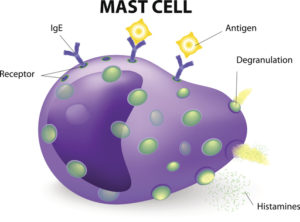
MCT’s are mostly diagnosed in middle-aged to older pets and while any breed of dog can develop it, breeds like boxers, bull terriers, pugs, and labrador retrievers make up for almost half of the cases in dogs.
MCT’s are mostly diagnosed in middle-aged to older pets and while any breed of dog can develop it, breeds like boxers, bull terriers, pugs, and labrador retrievers make up for almost half of the cases in dogs.
Most tumors are solitary and are most often noticed in the skin especially in sites like the limbs, lower abdomen, and chest, although they can also develop in subcutaneous tissues. The cause of MCT is still unknown, but because certain breeds are prone to this cancer, genetics are thought to play an important part.
Mast cell tumors can have a variety of appearances, from small lumps or bumps to swollen or ulcerated masses. They can also quickly change in size because of the reactions around the mass. They can get larger or smaller even on a daily basis and this can occur spontaneously or with the agitation of the tumor, which causes degranulation and subsequent swelling of the surrounding tissue.
Some pets can even show signs of systemic diseases due to reactions to the active compounds found within the mast cells like histamine and heparin. Ulcers due to histamine release can also form in the gastrointestinal tract causing symptoms like vomiting, loss of appetite, and lethargy.
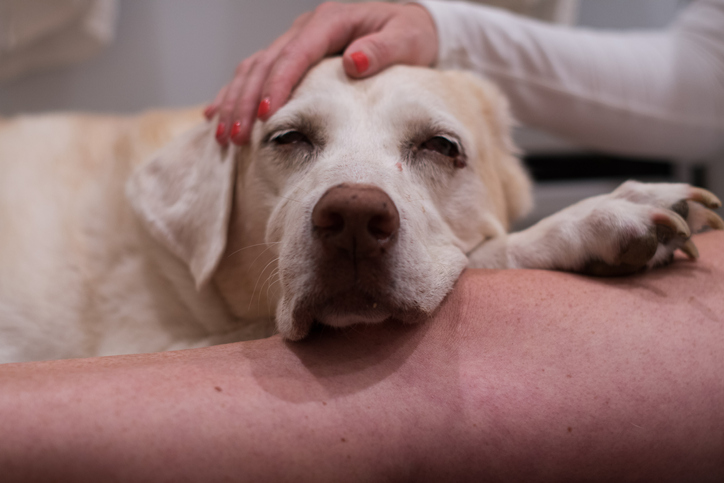
In order to diagnose MCT, a fine-needle aspirate (FNA) of the suspect mass is recommended. In this process, the veterinarian removes a sample of cells from the tumor with a small needle.
A biopsy of the tissue is recommended to verify the grade of the MCT which varies from I-III. MCT’s with grade I act more in a benign manner, and most can be cured with surgical removal while MCTs of grade III are more aggressive tumors that are locally invasive and have a higher rate of spread.
The veterinarian will be able to look for the spread of cancer to other areas of the body and suggest a treatment based on the findings.
For lower-grade tumors with no evidence of spread, normally surgery to remove the mass is recommended. In higher-grade cases, a combination of surgery, chemotherapy, and sometimes radiation therapy can be recommended. Antihistamine medications may be given to control the problems associated with histamine release as well.
You should avoid touching and manipulating the tumor as well as you should avoid your pet chew, lick, or scratch it. MCT’s are very reactive and the degranulation is easily triggered with pressure. Degranulation can lead to itchiness, swelling, discomfort, and even bleeding. Your pet might have to use an Elizabethan collar (E-collar or cone) to prevent licking the tumor while on treatment as well.
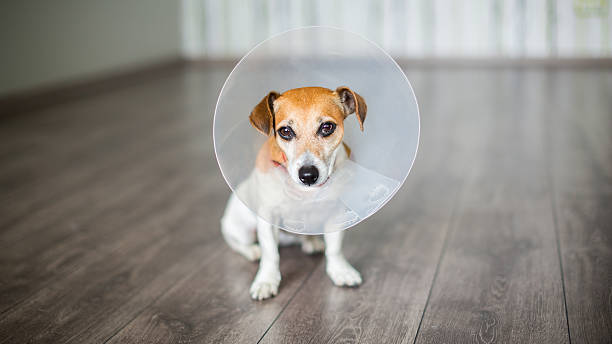
The prognosis for MCT depends upon the tumor grade, whether surgery has resulted in complete tumor removal, and if the MCT has spread or not. If the tumor was grade I or II, free of metastasis, and completely removed, the prognosis is good. With aggressive treatment in more advanced grade MCT, the prognosis is fair.
Early tumor detection and treatment can help with improving treatment outcomes and prognosis. If you notice any abnormalities in your little one’s skin, you should take him to the veterinarian for an evaluation immediately since although sometimes these tumors can mimic simple lesions like insect bites, in reality, they can be very aggressive.
NHV supplements may provide good support for your little one with Mast Cell Tumors. Besides providing a balanced diet, supplementing your little one’s regimen with Natures Immuno, Yucca, and Petomega 3 can definitely help.
Natures Immuno is a blend of mushrooms known for their extensive health benefits. These mushrooms are reported to help improve the body’s ability to produce white blood cells, it can be used as an adjunct with chemotherapy, it supports the immune system and helps fight against viral infections. It’s very beneficial as anti-cancer and anti-tumor support. It’s useful for cardiovascular, liver, kidney, diabetic, and endocrine health as well and helps promote general well-being. One of the mushrooms in this formula is the Turkey Tail mushroom. Studies have shown that it is beneficial for a wide variety of cancers, including mammary gland cancer and lymphoma. Researchers believe that Turkey Tail mushrooms contain properties that fight cancer while also helping to strengthen the immune system. The mushrooms in this formula also reduce the common side effects of chemotherapy in pets who become neutropenic, allowing pets to maintain a quality of life relatively close to their normal.
Yucca contains steroidal saponins that stimulate the body to produce its own natural corticosteroids. Corticosteroid is the most used drug for the therapy of mast cell tumors. It is well tolerated by dogs and is usually employed for a minimum of six months. Yucca’s extract is a powerful anti-inflammatory with nutritive properties that may help with symptom relief related to inflammation, discomfort, and loss of appetite as well.
Petomega 3 is a great source of EPA (Eicosapentaenoic Acid 600mg) and DHA (Docosahexaenoic acid 460mg) which are essential fatty acids that can be beneficial to a pet with cancer. They can decrease IgE-mediated activation of mast cells in several animal models and in human cells. They not only prevent weight loss, but they can also decrease inflammation and may inhibit metastasis as well.
When you find or see a lump or mass on your pet, we tend to think the worst. Even though the thought of our loved ones having a tumor may be scary, it’s important to go to the veterinarian right away to get a diagnosis as early as possible so that your furbaby has the best chance to get better. Our pet experts are always here for you in case you have any questions, so feel free to reach out to us at any time.
discomfort support

Discomfort Relief, Digestive Support, and Dog Appetite Booster
buy 2 and save $3
3 month supply for a small to medium size
Yucca for dogs is an all-natural supplement that can be helpful in many circumstances by providing symptom relief related to inflammation, discomfort, and loss of appetite.


Yucca for dogs is an all-natural supplement that can be helpful in many circumstances by providing symptom relief related to inflammation, discomfort, and loss of appetite.

Yucca root is widely used in dog food as well as in other pet foods. It is an herb that is highly nutritive as it is rich in vitamin C, beta-carotene, B vitamins, magnesium, iron, calcium, manganese, protein, niacin, and phosphorus. Yucca contains two very beneficial compounds: sarsasapogenin and smilagenin. These two compounds work on the mucous membranes of the small intestine. These compounds help with the penetration and absorption of minerals and vitamins. Sarsasapogenin and Smilagenin are known as steroidal saponins (phytosterols), which act as precursors to corticosteroids produced naturally by the body.
Steroidal-saponins support the immune function of the body while stimulating and supporting the production of its own corticosteroids and corticosteroid–related hormones. Due to this action, studies conducted on yucca have shown that it may be beneficial and effective for discomfort and inflammation in conditions such as arthritis. Yucca may also be effective as an appetite booster in dogs and may also help reduce the production of urease, which contributes to the unpleasant odors of urine and feces in some dogs.
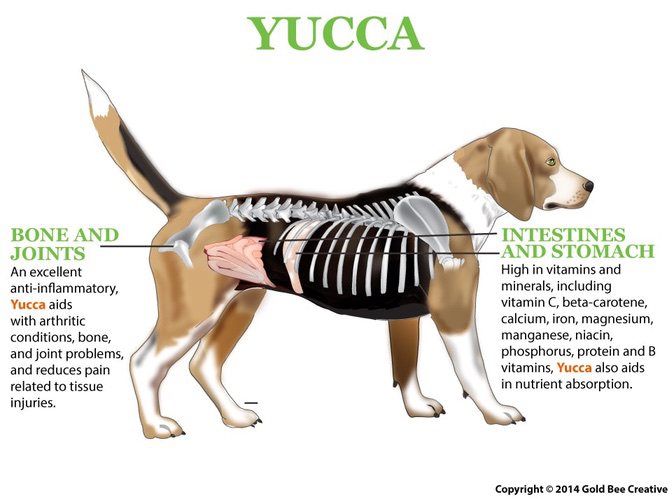
Yucca for dogs is commonly used for supporting arthritis, as an anti-inflammatory, nutritive, antitumor, and digestive. Yucca for dogs is considered a nutritive herb because it is rich in vitamins and minerals like vitamin C, beta-carotene, B vitamins, magnesium, iron, calcium, manganese, protein, niacin, and phosphorus.
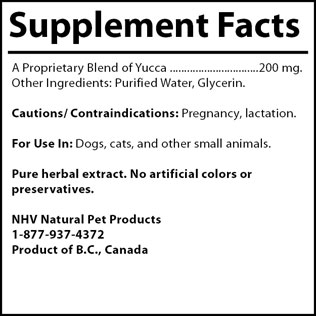
Select your pet's weight to determine the correct dose.
To be taken twice daily. Determine your pet’s weight and then use the easy chart below to determine the correct dose. This is the minimum dosage.
Pet's Weight Dosage
0 - 15 lb = 0.5 ml
16 - 30 lb = 1.0 ml
31 - 45 lb = 1.5 ml
46 - 60 lb = 2.0 ml
61 - 75 lb = 2.5 ml
Over 75 lb = 3.0 ml
How to Administer: Shake well before use. The easiest method is to use the dropper provided and place the drops into your pet’s food or favorite treat. You can also use the dropper and squirt directly into the pet’s mouth. Some pets can be finicky, if this occurs consider hiding the drops in foods most pet’s love such as fish, chicken or yogurt or a favorite treat. If your pet only eats dry food then soak a few kibbles at feeding time.
For Best Results: Herbal dietary supplements are beneficial to the health and well-being of your pet and are safe for long-term use. Every pet responds to natural herbal supplements differently, therefore it is important to be consistent and administer the product daily. Supplements generally take two to four weeks to take effect, however this will vary from one animal to the next.
Product Storage: All NHV Natural Pet Products are pure herbal extracts and contain no artificial additives, preservatives or coloring. Shelf life after opening is 6 months and must be refrigerated after opening.
Cautions and Contraindications: Do not use Yucca in pregnant or nursing animals. Speak to your vet before using our products. A second visit is recommended if your pet’s condition does not improve, or deteriorates after continued use of the supplements. All information provided by NHV Natural Pet Products is for educational purposes only.
Yucca root is widely used in dog food as well as in other pet foods. It is an herb that is highly nutritive as it is rich in vitamin C, beta-carotene, B vitamins, magnesium, iron, calcium, manganese, protein, niacin, and phosphorus. Yucca contains two very beneficial compounds: sarsasapogenin and smilagenin. These two compounds work on the mucous membranes of the small intestine. These compounds help with the penetration and absorption of minerals and vitamins. Sarsasapogenin and Smilagenin are known as steroidal saponins (phytosterols), which act as precursors to corticosteroids produced naturally by the body.
Steroidal-saponins support the immune function of the body while stimulating and supporting the production of its own corticosteroids and corticosteroid–related hormones. Due to this action, studies conducted on yucca have shown that it may be beneficial and effective for discomfort and inflammation in conditions such as arthritis. Yucca may also be effective as an appetite booster in dogs and may also help reduce the production of urease, which contributes to the unpleasant odors of urine and feces in some dogs.

Yucca for dogs is commonly used for supporting arthritis, as an anti-inflammatory, nutritive, antitumor, and digestive. Yucca for dogs is considered a nutritive herb because it is rich in vitamins and minerals like vitamin C, beta-carotene, B vitamins, magnesium, iron, calcium, manganese, protein, niacin, and phosphorus.

Select your pet's weight to determine the correct dose.
To be taken twice daily. Determine your pet’s weight and then use the easy chart below to determine the correct dose. This is the minimum dosage.
Pet's Weight Dosage
0 - 15 lb = 0.5 ml
16 - 30 lb = 1.0 ml
31 - 45 lb = 1.5 ml
46 - 60 lb = 2.0 ml
61 - 75 lb = 2.5 ml
Over 75 lb = 3.0 ml
How to Administer: Shake well before use. The easiest method is to use the dropper provided and place the drops into your pet’s food or favorite treat. You can also use the dropper and squirt directly into the pet’s mouth. Some pets can be finicky, if this occurs consider hiding the drops in foods most pet’s love such as fish, chicken or yogurt or a favorite treat. If your pet only eats dry food then soak a few kibbles at feeding time.
For Best Results: Herbal dietary supplements are beneficial to the health and well-being of your pet and are safe for long-term use. Every pet responds to natural herbal supplements differently, therefore it is important to be consistent and administer the product daily. Supplements generally take two to four weeks to take effect, however this will vary from one animal to the next.
Product Storage: All NHV Natural Pet Products are pure herbal extracts and contain no artificial additives, preservatives or coloring. Shelf life after opening is 6 months and must be refrigerated after opening.
Cautions and Contraindications: Do not use Yucca in pregnant or nursing animals. Speak to your vet before using our products. A second visit is recommended if your pet’s condition does not improve, or deteriorates after continued use of the supplements. All information provided by NHV Natural Pet Products is for educational purposes only.
overall vitality
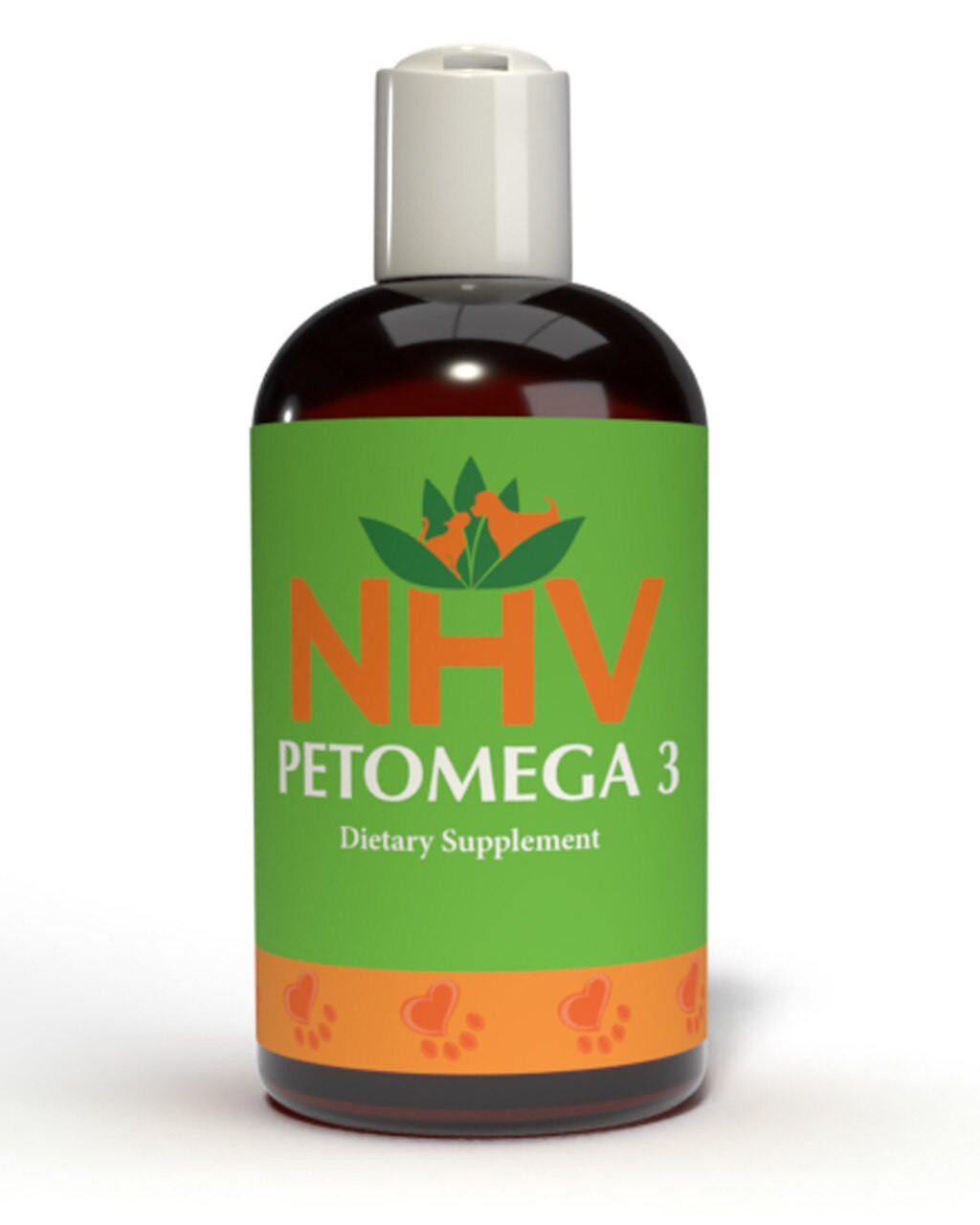
For Overall Health and Well-Being
buy 2 and save $3
Support your dog’s health with omega 3 fish oil for dogs. Help them maintain a healthy coat, eyes, joints, immune system and overall organ function.


Support your dog’s health with omega 3 fish oil for dogs. Help them maintain a healthy coat, eyes, joints, immune system and overall organ function.

Our omega 3 fish oil for dogs is a great source of EPA (Eicosapentaenoic Acid 600mg) and DHA (Docosahexaenoic acid 460mg) essential fatty acids. This fish oil supplement for dogs is derived from sardines, anchovies and North Atlantic cod liver oil. It is molecularly distilled and cold pressed to improve the bioavailability of the omega 3 fatty acids, and is medical and human grade quality.
Omega 3 fish oil for dogs may be beneficial for the following:
Processed pet foods have increased omega-6 fatty acids, and decreased omega-3 fatty acids. The University of Maryland Medical Center states, "It is very important to maintain a balance between omega-3 and omega-6 fatty acids in the diet. A proper balance helps maintain and even improve health." Your dog’s body cannot easily make essential fatty acids. It is vital to provide omega 3 fish oil for dogs as an added supplement to your pet’s daily diet.
The American Journal of Veterinary Medicine has published studies on the benefits of omega 3 fatty acids (fish oils) for arthritis and degenerative joint disease in dogs. The studies showed that dogs who were given omega 3 fatty acids had a significantly improved ability to get up from a resting position and marked improvement in walking ability.
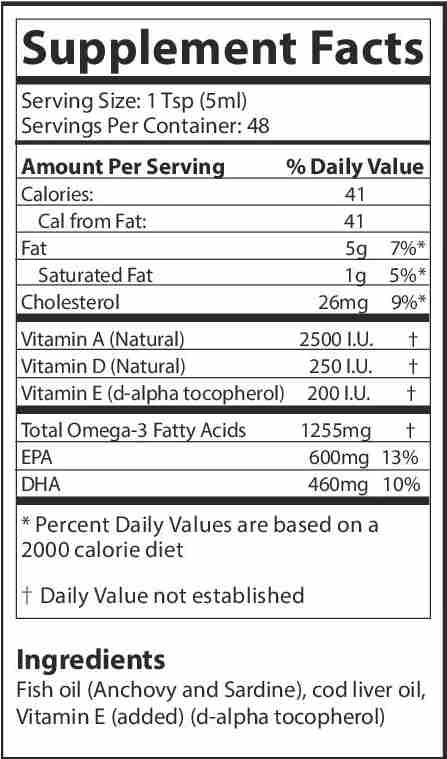
Suggested Dosage: To be taken once per day. Add to food based on weight chart.
Therapeutic Dosage: Double the quantity for maximum period of 4 weeks or follow veterinarian advise.
Pet’s Weight Dosage
0-15 lb = ¼ tsp
15-30 lb = ½ tsp
30-60 lb = 1 tsp
60-90 lb = 1 ½ tsp
How to Administer: Shake well before use. The easiest method is to add the dosage to your pets food. Some pets can be finicky, if this occurs consider hiding the appropriate amount in food most pet’s love such as fish, chicken, yogurt, or a favorite treat. If your pet only eats dry food then soak kibbles at feeding time.
For Best Results
Dietary supplements are beneficial to the health and well-being of your pet and are safe for long-term use. Every pet responds to natural supplements differently, therefore it is important to be consistent and administer the product daily. Supplements generally take two to four weeks to take effect, however this will vary from one animal to the next.
Product Storage
All NHV Natural Pet Products contain no artificial additives, preservatives or coloring. Shelf life after opening is 6 months and must be refrigerated after opening.
Cautions and Contraindications
Avoid During Pregnancy.
Our omega 3 fish oil for dogs is a great source of EPA (Eicosapentaenoic Acid 600mg) and DHA (Docosahexaenoic acid 460mg) essential fatty acids. This fish oil supplement for dogs is derived from sardines, anchovies and North Atlantic cod liver oil. It is molecularly distilled and cold pressed to improve the bioavailability of the omega 3 fatty acids, and is medical and human grade quality.
Omega 3 fish oil for dogs may be beneficial for the following:
Processed pet foods have increased omega-6 fatty acids, and decreased omega-3 fatty acids. The University of Maryland Medical Center states, "It is very important to maintain a balance between omega-3 and omega-6 fatty acids in the diet. A proper balance helps maintain and even improve health." Your dog’s body cannot easily make essential fatty acids. It is vital to provide omega 3 fish oil for dogs as an added supplement to your pet’s daily diet.
The American Journal of Veterinary Medicine has published studies on the benefits of omega 3 fatty acids (fish oils) for arthritis and degenerative joint disease in dogs. The studies showed that dogs who were given omega 3 fatty acids had a significantly improved ability to get up from a resting position and marked improvement in walking ability.

Suggested Dosage: To be taken once per day. Add to food based on weight chart.
Therapeutic Dosage: Double the quantity for maximum period of 4 weeks or follow veterinarian advise.
Pet’s Weight Dosage
0-15 lb = ¼ tsp
15-30 lb = ½ tsp
30-60 lb = 1 tsp
60-90 lb = 1 ½ tsp
How to Administer: Shake well before use. The easiest method is to add the dosage to your pets food. Some pets can be finicky, if this occurs consider hiding the appropriate amount in food most pet’s love such as fish, chicken, yogurt, or a favorite treat. If your pet only eats dry food then soak kibbles at feeding time.
For Best Results
Dietary supplements are beneficial to the health and well-being of your pet and are safe for long-term use. Every pet responds to natural supplements differently, therefore it is important to be consistent and administer the product daily. Supplements generally take two to four weeks to take effect, however this will vary from one animal to the next.
Product Storage
All NHV Natural Pet Products contain no artificial additives, preservatives or coloring. Shelf life after opening is 6 months and must be refrigerated after opening.
Cautions and Contraindications
Avoid During Pregnancy.
Pet Nutrition
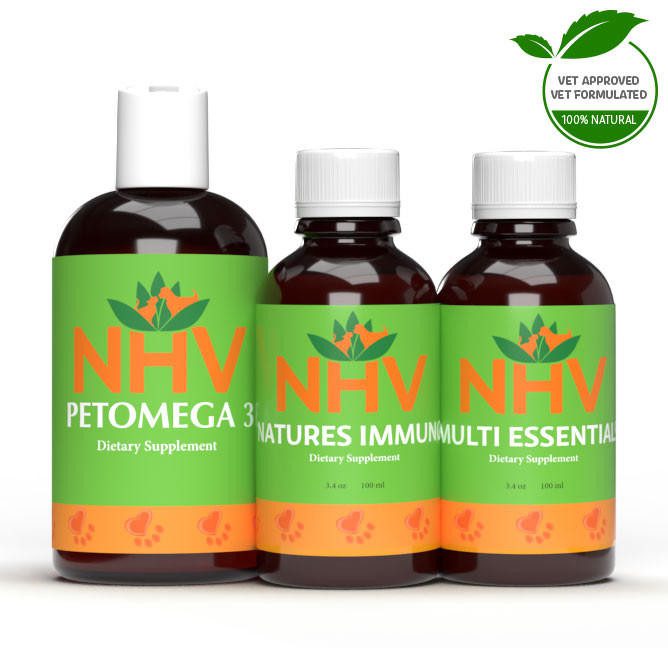
Natural Pet Nutrition Supplements for Cats and Dogs
bundle and save with pet expert kits
3 month supply for a small to medium size pet
As pet parents, we all want our little ones to live a long and healthy life. To help your cat or dog age gracefully, our pet nutrition products are formulated to fill nutritional voids, soothe inflammation and offer a beneficial aid for rebalancing immune health.

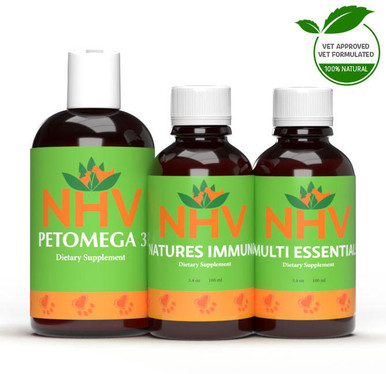
As pet parents, we all want our little ones to live a long and healthy life. To help your cat or dog age gracefully, our pet nutrition products are formulated to fill nutritional voids, soothe inflammation and offer a beneficial aid for rebalancing immune health.

All pet pawrents want their furkiddos to live a long and healthy life. Good health begins with adequate nutrition. So for all those pets out there who want a little nutritional support or may be battling a serious illness, Our Pet Nutrition Supplement Bundle offers comprehensive support for many body processes, including rebalancing immune health and relieving inflammation. All of our supplements are made with full-spectrum plant extracts that are formulated specifically for pets. Full-spectrum means that all of the vitamins, minerals and trace elements are kept intact during the extraction process to make it absorbable for your little one's body.
NHV Multi Essentials is full of vitamins and minerals to help improve digestion and absorption and fill nutritional voids due to poor diet or illness. The omega 3 fatty acids in PetOmega 3 work to relieve inflammation in the GI tract, promote healthy digestion and balance appetite. Natures Immuno's mushroom blend is formulated with anti-inflammatory properties that gently rebalance the immune system (without overstimulating it) and offers cardiovascular, liver, kidney, diabetic, and endocrine health support.
MULTI ESSENTIALS
PETOMEGA 3
NATURES IMMUNO
Help your Pet Live Their Best Life With NHV Supplements
For optimal health, it’s a great idea to supplement your furkiddo’s daily meals with nutrients and immune-boosting ingredients. All of our products are 100% natural and their liquid formulation makes it easy to hide in food. If you need an extra hand (or paw) to improve your pet’s health, get in touch with one of our in-house pet experts. We’re always happy to help!
Made with the finest, organically grown, or ethically harvested herbs. Made specifically for pets, vet-formulated and vet approved.
Multi Essentials
PetOmega 3
Natures Immuno
Select your pet's weight to determine the correct dose.
PETOMEGA 3 : Pet’s Weight Dosage to be taken once a day.
0-15 lb = ¼ tsp
15-30 lb = ½ tsp
30-60 lb = 1 tsp
60-90 lb = 1 ½ tsp
MULTI ESSENTIALS, NATURES IMMUNO : To be taken twice daily. Determine your pet’s weight and then use the easy chart below to determine the correct dose. This is the minimum dosage.
Pet's Weight Dosage
0 - 15 lb = 0.5 ml
16 - 30 lb = 1.0 ml
31 - 45 lb = 1.5 ml
46 - 60 lb = 2.0 ml
61 - 75 lb = 2.5 ml
Over 75 lb = 3.0 ml
How to Administer
Shake well before use. The easiest method is to use the dropper provided and place the drops into your pet’s food or favorite treat. You can also use the dropper and squirt directly into the pet’s mouth. Some pets can be finicky, if this occurs consider hiding the drops in foods most pet’s love such as fish, chicken or yogurt or a favorite treat. If your pet only eats dry food then soak a few kibbles at feeding time.
For Best Results
Herbal dietary supplements are beneficial to the health and well-being of your pet and are safe for long-term use. Every pet responds to natural herbal supplements differently, therefore it is important to be consistent and administer the product daily. Supplements generally take two to four weeks to take effect, however this will vary from one animal to the next.
Product Storage
All NHV Natural Pet Products are pure herbal extracts and contain no artificial additives, preservatives or coloring. Shelf life after opening is 6 months and must be refrigerated after opening.
Cautions and Contraindications
Do not use in pregnant or nursing animals.
All information provided by NHV Natural Pet Products is for educational purposes only.
All information provided by NHV Natural Pet Products is for educational purposes only.
All pet pawrents want their furkiddos to live a long and healthy life. Good health begins with adequate nutrition. So for all those pets out there who want a little nutritional support or may be battling a serious illness, Our Pet Nutrition Supplement Bundle offers comprehensive support for many body processes, including rebalancing immune health and relieving inflammation. All of our supplements are made with full-spectrum plant extracts that are formulated specifically for pets. Full-spectrum means that all of the vitamins, minerals and trace elements are kept intact during the extraction process to make it absorbable for your little one's body.
NHV Multi Essentials is full of vitamins and minerals to help improve digestion and absorption and fill nutritional voids due to poor diet or illness. The omega 3 fatty acids in PetOmega 3 work to relieve inflammation in the GI tract, promote healthy digestion and balance appetite. Natures Immuno's mushroom blend is formulated with anti-inflammatory properties that gently rebalance the immune system (without overstimulating it) and offers cardiovascular, liver, kidney, diabetic, and endocrine health support.
MULTI ESSENTIALS
PETOMEGA 3
NATURES IMMUNO
Help your Pet Live Their Best Life With NHV Supplements
For optimal health, it’s a great idea to supplement your furkiddo’s daily meals with nutrients and immune-boosting ingredients. All of our products are 100% natural and their liquid formulation makes it easy to hide in food. If you need an extra hand (or paw) to improve your pet’s health, get in touch with one of our in-house pet experts. We’re always happy to help!
Made with the finest, organically grown, or ethically harvested herbs. Made specifically for pets, vet-formulated and vet approved.
Multi Essentials
PetOmega 3
Natures Immuno
Select your pet's weight to determine the correct dose.
PETOMEGA 3 : Pet’s Weight Dosage to be taken once a day.
0-15 lb = ¼ tsp
15-30 lb = ½ tsp
30-60 lb = 1 tsp
60-90 lb = 1 ½ tsp
MULTI ESSENTIALS, NATURES IMMUNO : To be taken twice daily. Determine your pet’s weight and then use the easy chart below to determine the correct dose. This is the minimum dosage.
Pet's Weight Dosage
0 - 15 lb = 0.5 ml
16 - 30 lb = 1.0 ml
31 - 45 lb = 1.5 ml
46 - 60 lb = 2.0 ml
61 - 75 lb = 2.5 ml
Over 75 lb = 3.0 ml
How to Administer
Shake well before use. The easiest method is to use the dropper provided and place the drops into your pet’s food or favorite treat. You can also use the dropper and squirt directly into the pet’s mouth. Some pets can be finicky, if this occurs consider hiding the drops in foods most pet’s love such as fish, chicken or yogurt or a favorite treat. If your pet only eats dry food then soak a few kibbles at feeding time.
For Best Results
Herbal dietary supplements are beneficial to the health and well-being of your pet and are safe for long-term use. Every pet responds to natural herbal supplements differently, therefore it is important to be consistent and administer the product daily. Supplements generally take two to four weeks to take effect, however this will vary from one animal to the next.
Product Storage
All NHV Natural Pet Products are pure herbal extracts and contain no artificial additives, preservatives or coloring. Shelf life after opening is 6 months and must be refrigerated after opening.
Cautions and Contraindications
Do not use in pregnant or nursing animals.
All information provided by NHV Natural Pet Products is for educational purposes only.
All information provided by NHV Natural Pet Products is for educational purposes only.
Published: October 17, 2020
2 replies
7 yr old Jack Russell had lump on right ear -surgically removed without good margins-oncologist says remove ear? On benadryl-any recommendations?
Hi Kathryn,
We’re so sorry to hear your pup is struggling with a tumor!
NHV Stimmune and Natures Immuno are good options for helping with mast cell tumors due to their immunomodulatory and anti-inflammatory properties.
A hypoallergenic diet is also helpful because this type of cancer releases histamine, which can impact the gastrointestinal system.
You can find more information on these formulas here: https://www.nhvnaturalpetproducts.com/natures-immuno-medicinal-mushroom-blend-dogs
https://www.nhvnaturalpetproducts.com/stimmune-dog-allergy-relief-dog-immune-system-booster
We hope this information helps! Please feel free to let us know if you have any questions whatsoever, our team is always here for you.
Sending all our love and healing vibes your way!
Yours in wellness,
Team NHV